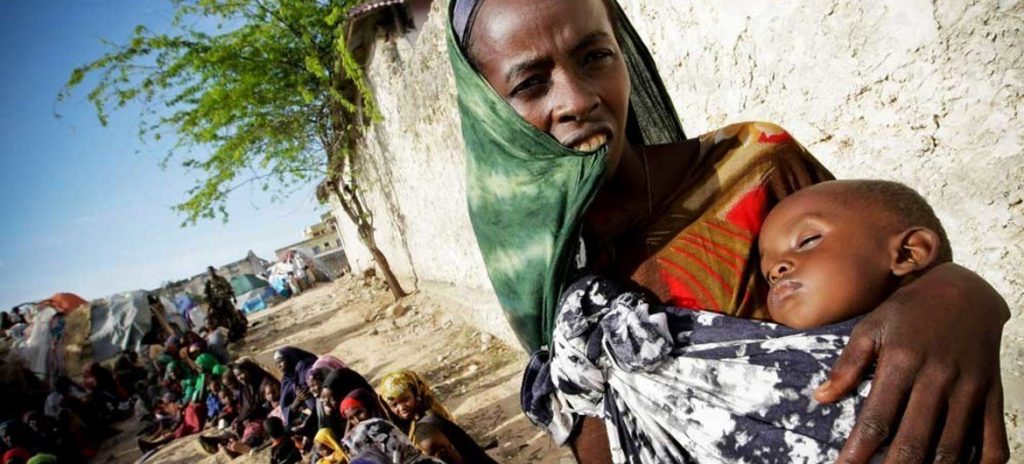“Those with the power and money to change this must come together to better respond to current crises and prevent and prepare for future ones,” a coalition of charities asserted.
By Brett Wilkins Published 9-20-2022 by Common Dreams

A Somali woman and her severely malnourished child wait for medical assistance from the African Union Mission in Somalia. Photo: UN
As a new analysis revealed that the global ranks of the superrich soared to a record number, a coalition of charity groups said Tuesday that hundreds of millions of people around the world are hungry—and that someone starves to death every four seconds.
At least 238 international and local charities from 75 countries signed an open letter noting that “a staggering 345 million people are now experiencing acute hunger, a number that has more than doubled since 2019.”
“Despite promises from world leaders to never allow famine again in the 21st century, famine is once more imminent in Somalia,” the signers stated. “Around the world, 50 million people are on the brink of starvation in 45 countries.”
The letter—which was timed to coincide with the annual meeting of the United Nations General Assembly in New York—asserts that “the global hunger crisis has been fueled by a deadly mix of poverty, social injustice, gender inequality, conflict, climate change, and economic shocks, with the lingering impacts of the Covid-19 pandemic and the crisis in Ukraine further driving up food prices and the cost of living.”
“Those with the power and money to change this must come together to better respond to current crises and prevent and prepare for future ones,” the signatories argued.
Our global food system is a broken system.
A broken system made even more fragile owing to climate breakdown, economic upheaval & #COVID19.
A broken system that is concentrating power & profits in the hands of a few. 62 new food billionaires were created during the pandemic. pic.twitter.com/tNghEVVqE4
— Gabriela Bucher (@Gabucher) September 20, 2022
The number of those with the most money grew to a record number last year.
According to an analysis published Tuesday by Credit Suisse, there were 218,200 ultra-high net worth (UHNW) people in the world in 2021, an increase of 46,000 from the previous year. The share of the world’s wealth held by the richest 1% of people also increased from 44% to 46% last year.
Credit Suisse said there were 62.5 million U.S. dollar millionaires on Earth, and that all the wealth in the world added up to $463.6 trillion, while attributing what one of the report’s authors called the “explosion of wealth” to soaring home and stock values.
A separate report published in July by letter signatory Oxfam revealed that profits from soaring food prices have enriched billionaires around the world by a collective $382 billion.
Imagine having your crops go from thriving to nothing due to extreme weather events in 2021. People in Africa are the most impacted by hunger, with about 120M people suffering a hunger crisis. We must act now! #ActOnClimate
Sign the open letter: https://t.co/2jHv1SAsUr pic.twitter.com/XUP422stiz— Oxfam International (@Oxfam) September 20, 2022
Meanwhile, Sumaya, a 32-year-old mother of four living in a camp for internally displaced people in Ethiopia’s Somali region, lamented her family’s dire situation in the charity groups’ letter: “No water, no food, a hopeless life.”
“Above all, my children are starving,” she said. “They are on the verge of death. Unless they get some food, I’m afraid they will die.”
Last week, Oxfam published a report underscoring how the climate emergency is exacerbating extreme hunger. The report examined 10 of the world’s worst climate hot spots, where 18 million people are on the brink of starvation.
Mohanna Ahmed Ali Eljabaly of the Yemen Family Care Association, which also signed the charities’ letter, said that “it is abysmal that with all the technology in agriculture and harvesting techniques today we are still talking about famine in the 21st century.”
“This is not about one country or one continent and hunger never only has one cause. This is about the injustice of the whole of humanity,” she continued. “It is extremely difficult to see people suffering while others sharing the same planet have plenty of food.”
“We must not wait a moment longer to focus both on providing immediate lifesaving food and longer-term support,” Elhjabaly added, “so people can take charge of their futures and provide for themselves and their families.”

